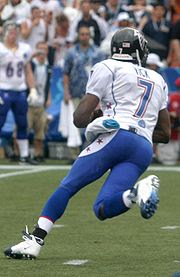 Yesterday, the Associated Press (via ESPN.com) reported that NFL Commissioner Roger Goodell plans to move slowly on whether to reinstate quarterback Michael Vick into the league. The implication here is that Goodell has full discretion over the length of player suspensions. However, I believe the Associated Press fails to consider the antitrust limits to Goodell's purported authority.
Yesterday, the Associated Press (via ESPN.com) reported that NFL Commissioner Roger Goodell plans to move slowly on whether to reinstate quarterback Michael Vick into the league. The implication here is that Goodell has full discretion over the length of player suspensions. However, I believe the Associated Press fails to consider the antitrust limits to Goodell's purported authority.
In a recent law review article entitled "Are Commissioner Suspensions Really Any Different From Illegal Group Boycotts," I argue that the 3rd, 6th, 8th and D.C. Circuits might find Goodell's attempt to indefinitely suspend Michael Vick to violate Section 1 of the Sherman Act. This is because the NFL Personal Conduct Policy serves as an agreement amongst the 32 independently owned NFL-clubs to boycott a particular player. At the same time, the NFL Personal Conduct Policy seems to harm consumers by taking away their ability to voice a preference for football games that contain Michael Vick.
In antitrust terms, this is essentially the Spencer Haywood or Maurice Clarett case all over again, but with "NFL Personal Conduct Policy" replacing "League Age Requirement" as the purportedly anticompetitive conduct.
Indeed, player suspensions today are common in sports. However, the NFL's attempt to enforce its Personal Conduct Policy is different in three ways: (1) the NFL Personal Conduct Policy leads to player suspensions for more than just a de minimis number of games; (2), the NFL Personal Conduct Policy does not involve conduct so directly related to the existence of a sport that it is needed to make the sports product viable; and (3) the NFL Collective Bargaining Agreement ("CBA") does not specifically empower the league commissioner to suspend players for off-the-field wrongdoing (albeit, the NFL CBA more generally allows the commissioner to suspend players for conduct "detrimental to the League or professional football").
Of course, this does not mean that the Atlanta Falcons will be stuck with Michael Vick at quarterback. Indeed, in my article, I propose four legal, and I believe more appropriate ways, for the NFL clubs to address player misconduct: (1) individual teams can release players for breach of the morals clause in their contracts; (2) the NFL teams can petition Congress to publicly regulate pro football player eligibility; (3) the NFL teams could petition Congress for a limited antitrust exemption to regulate player eligibility; or (4) the NFL teams could collective bargain with the NFL Players Association to add the NFL Personal Conduct Policy directly into the CBA.
A fifth and final way that the NFL teams might become able to ban players from the league would be to convince the Supreme Court toconstrue the NFL as a single-entity for all purposes. Some, such as ESPN's Lester Munson, are fearful that such "Armageddon" might happen. Meanwhile, others at Sports Law Blog find a broad-based single-entity ruling in favor of the NFL less likely.
***
For further discussion of these issues, please see Marc Edelman, Are Commissioner Suspensions Really Any Different From Illegal Group Boycotts: Analyzing Whether The NFL Personal Conduct Policy Illegally Restrains Trade, 58 Catholic University Law Review 631 (2009).





0 comments:
Post a Comment